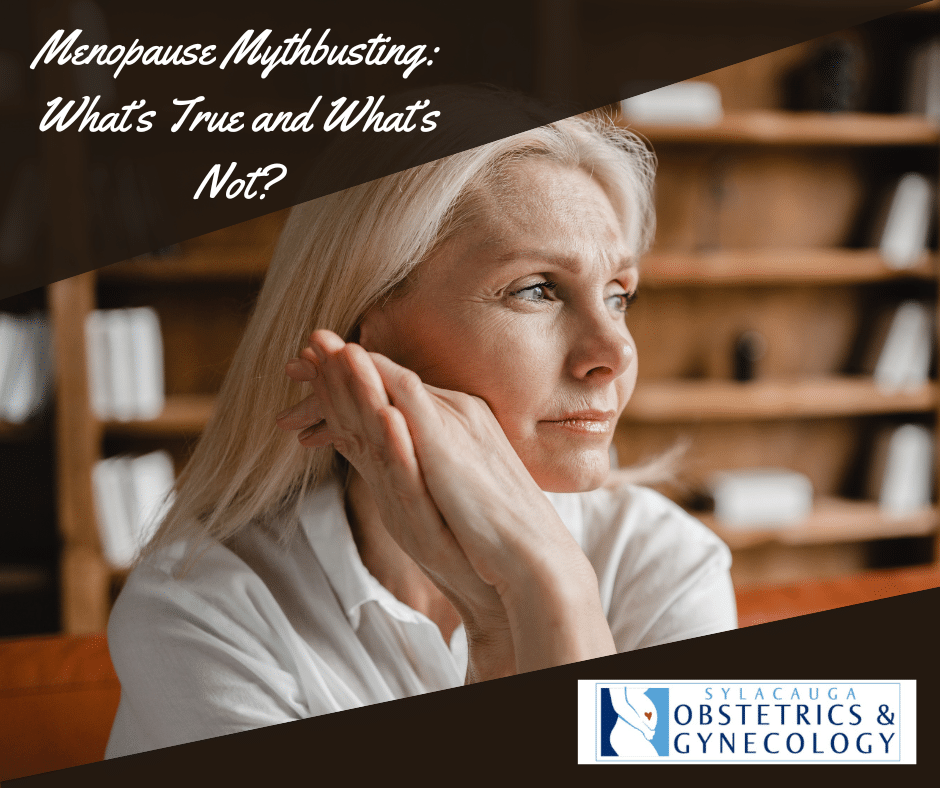
21 Mar Menopause Mythbusting: What’s True and What’s Not?
Menopause is a natural part of life, but there are plenty of myths that can make it seem confusing and frightening. Misunderstandings about symptoms, treatments, and what menopause actually means can leave many women feeling uncertain about what to expect. But here’s the truth—menopause doesn’t have to be overwhelming.
Knowing the facts can help you feel more in control of your health and make decisions that work best for you. Today, Sylacauga GYN will break down some of the most common menopause myths and set the record straight.
What Is Menopause?
Before we jump into the myths, let’s quickly cover what menopause really is. It marks the point when a woman has gone 12 months without a period. This typically happens between ages 45 and 55, with 51 being the average in the U.S.
The time leading up to menopause is called perimenopause, which can last several years. During this phase, hormone levels fluctuate, and you might notice changes in your body, mood, and energy levels. But menopause isn’t an illness—it’s a normal transition, just like puberty, and every woman experiences it a little differently.
10 Common Menopause Myths
Myth 1: Menopause Always Starts at 50
Truth: While 51 is the average age, menopause can start earlier or later. Some see signs of menopause in their early 40s, while others don’t reach menopause until their late 50s. Though rare, premature menopause—when a woman’s menstrual cycle stops before the age of 40—is also a possibility.
Genetics, lifestyle, and medical conditions can all influence when it happens.
Myth 2: Every Woman Has the Same Symptoms
Truth: No two menopause experiences are exactly alike. Some women have intense hot flashes and mood swings, some struggle with urinary tract infections, and others barely notice any changes. Your symptoms—and how long they last—depend on your body, genetics, and overall health.
Myth 3: Menopause Means Your Sex Life Is Over
Truth: Menopause can bring changes like vaginal dryness or a lower libido, but that doesn’t mean intimacy has to end. There are treatments, including lubricants and hormone therapy, that can help. In fact, some women may find their sex life improves after menopause since they no longer have to worry about pregnancy.
Myth 4: Weight Gain Is Unavoidable
Truth: While hormonal changes can make it easier to gain weight, it’s not a given. Staying active, eating well, and managing stress can help maintain a healthy weight. Strength training and a balanced diet play a big role in keeping your metabolism strong.
Myth 5: Hormone Therapy Is Too Risky
Truth: Hormone Replacement Therapy (HRT) isn’t everyone’s choice for menopause treatment, but for many women, it’s a safe and effective way to relieve symptoms. Studies show that for women under 60 or within 10 years of menopause, the benefits often outweigh the risks.
Reach out to Sylacauga GYN to see if HRT is a good option for you!
Myth 6: Menopause Symptoms Last Forever
Truth: Symptoms like hot flashes, brain fog, and mood swings don’t last forever. They typically fade over time, though some women may experience mild symptoms for years. The good news? There are many ways to manage them, from lifestyle changes to hormonal treatments.
Myth 7: You Can’t Get Pregnant During Perimenopause
Truth: While fertility declines, pregnancy is still possible until you’ve gone 12 months without a menstrual period. If you’re not planning to have children, birth control is still important during perimenopause.
Myth 8: Menopause Causes Depression
Truth: Menopause can cause mood swings, but it doesn’t cause clinical depression. However, if you have a history of depression or anxiety, hormone changes might make symptoms worse. If you’re feeling persistently sad or anxious, it’s always worth talking to your doctor.
Myth 9: Natural Remedies Are Always Safer Than Medical Treatments
Truth: Herbal remedies can help with symptoms, but they aren’t automatically safer than medical treatments. Some supplements interact with medications or have side effects. To catch these potential interactions, please check with your doctor before trying any new treatments.
Myth 10: Menopause Means You’re Old
Truth: Menopause isn’t the end of your life—it’s just another stage of life. Many women find this time empowering, with a new sense of freedom and confidence. Age is just a number, and menopause doesn’t change that.
What About Hormone Therapy?
There’s been a lot of debate about Hormone Replacement Therapy (HRT), but here’s what you should know:
- HRT can relieve many symptoms, including hot flashes, night sweats, and vaginal dryness.
- It may help protect against osteoporosis and heart disease when started early in menopause.
- There are different types of HRT, including pills, patches, and creams, so there are options to fit your needs and boost quality of life.
- It’s not right for everyone. Women with a history or increased risk of breast cancer, blood clots, or certain other conditions should explore alternative treatment options.
Your doctor can help you weigh your risk factors against the benefits based on your personal health history.
Managing Menopause Your Way
This time of life is a big change, but it doesn’t have to be a struggle. Understanding what separates menopause facts from fiction can make this transition much easier.
If you have questions or need support, Sylacauga OB/GYN is here to help. Our team provides expert care and guidance so you can feel your best at every stage of life.
Struggling With Menopause Symptoms? Let Sylacauga OB/GYN Help You Find Relief.
At Sylacauga OB/GYN, our experienced team is here to provide compassionate, personalized care to help you manage menopause your way. If you’re looking for hormone therapy, lifestyle recommendations, or expert guidance on your options, we’ll support you every step of the way.
Take control of your menopause journey— Give us a call at 256-249-6995 or book online today. We can’t wait to hear from you!


